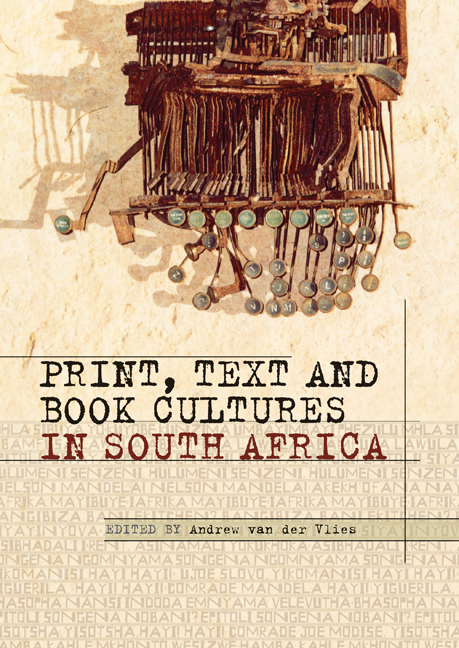Book contents
- Frontmatter
- Contents
- Acknowledgements
- Abbreviations and acronyms
- 1 Introductory
- 2 Print Cultures and Colonial Public Spheres
- 2.1 Metonymies of Lead: Bullets, Type and Print Culture in South African Missionary Colonialism
- 2.2 “Spread Far and Wide over the Surface of the Earth”: Evangelical Reading Formations and the Rise of a Transnational Public Sphere: The Case of the Cape Town Ladies’ Bible Association
- 2.3 Textual Circuits and Intimate Relations: A Community of Letters across the Indian Ocean
- 3 Local/Global: South African Writing and Global Imaginaries
- 4 Three Ways of Looking at Coetzee
- 5 Questions of the Archive and the Uses of Books
- 6 Orature, Image, Text
- 7 Ideological Exigencies and the Fates of Books
- 8 New Directions
- Contributors
- Index
2.1 Metonymies of Lead: Bullets, Type and Print Culture in South African Missionary Colonialism
from 2 - Print Cultures and Colonial Public Spheres
Published online by Cambridge University Press: 21 April 2018
- Frontmatter
- Contents
- Acknowledgements
- Abbreviations and acronyms
- 1 Introductory
- 2 Print Cultures and Colonial Public Spheres
- 2.1 Metonymies of Lead: Bullets, Type and Print Culture in South African Missionary Colonialism
- 2.2 “Spread Far and Wide over the Surface of the Earth”: Evangelical Reading Formations and the Rise of a Transnational Public Sphere: The Case of the Cape Town Ladies’ Bible Association
- 2.3 Textual Circuits and Intimate Relations: A Community of Letters across the Indian Ocean
- 3 Local/Global: South African Writing and Global Imaginaries
- 4 Three Ways of Looking at Coetzee
- 5 Questions of the Archive and the Uses of Books
- 6 Orature, Image, Text
- 7 Ideological Exigencies and the Fates of Books
- 8 New Directions
- Contributors
- Index
Summary
LANGUE: THE CONTEXT OF PRINT CULTURE
It would be a commonplace to say that the history of print culture can be seen as a midpoint, a swivel, in the larger history of colonisation and modernisation in South Africa, and yet this remains a point of profound significance in any encompassing review of the country's violent emergence as a state, a polity in the modern sense, with a constructed—although persistently contested— sense of its own public sphere. The very construction of such a sphere, a logos-centred site of deliberative public reason in the Kantian sense, in which a Westphalian state would eventually emerge, depended critically on the development of a print culture. In the same way that the spine of a book glues together the divergence of the volume's contents within a single, usable and handy form, so the introduction of print enabled a medial convergence, a technological axis in whose versatile embrace all parties in an otherwise Babelesque swirl of incommensurability could—theoretically— both speak and be heard across time and space. In what would only much later become known as “South Africa”, such a medial convergence gained purchase on most parties in an otherwise radically heterogeneous spread of communicative modalities, because the politics of colonial power relied on print culture as a means of dissemination and decree, diktat and didactics. In other words, not only was print one of the principal media of governance (legislation, proclamation, court records, executive decree), it was also the means of educational transmission and cultural persuasion (primers, dictionaries, textbooks, monographs, accounts of heroic missionary travels, the Bible and its many translations, religious tracts, literature, orthographies). The book in the narrower sense—and print culture in the larger sense—thus acted as a critically important technology through which were channelled the momentous battles over identity and the contests over “proper” forms of human subjectivity that were such a defining characteristic of the colonial period in South Africa, particularly in the nineteenth century.
- Type
- Chapter
- Information
- Print, Text and Book Cultures in South Africa , pp. 50 - 73Publisher: Wits University PressPrint publication year: 2012



